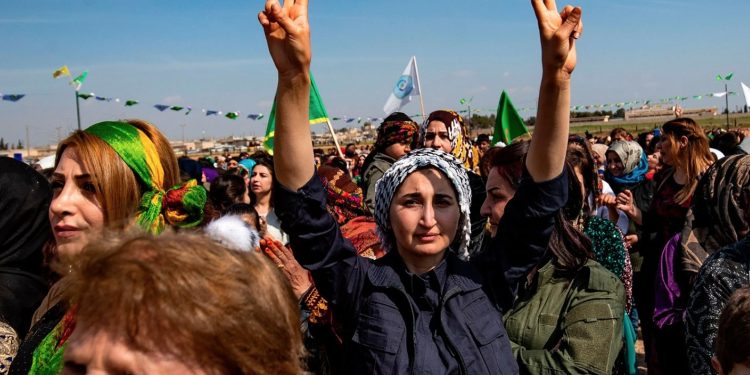NEWS CENTER – 26 names from different countries and different professional groups published a declaration titled “We Celebrate Rojava’s 10th Anniversary: A Visionary Social Experiment Under Threat”. The signatories, including Noam Chomsky, Claudio Miranda and Silvia Federici Emeritierte, demanded that the airspace in northeastern Syria be closed in order to prevent the attacks of the Turkish state.
Noting the importance of the Rojava Revolution, the signatories said, “A good experiment began with one of the most brutal massacres of this century,” and expressed the following: “When the Rojava revolution came in 2017, Kurds, Arabs, Assyrians, Turkmens, Armenians, Yazidis and others encompassed 5 million people. Guided by one of the most democratic constitutions in the world, the people of Rojava have established a decentralized system of self-government based on popular assemblies, gender equality and radical inclusion of minorities.”
‘WE WERE POSSIBLY WHO DID NOT SEE WHEN IT WAS ESTABLISHED’
Emphasizing that the Rojava Revolution recognized the necessity of women’s leadership at all levels of social and political life, a community-based restorative justice system, respect for all living things and regenerative agriculture, the following emphasis came to the fore: means participating in the work of testing concrete ways of life beyond capitalism and patriarchy. The 10th anniversary may have seemed unlikely when the community was first established, but their continued existence is a testament to the extraordinary resilience and dedication of the people of Rojava, who willingly accept the consequences of their actions.”
Pointing out that Rojava’s anniversary is under threat of an even more devastating attack, the signatories made the following assessment regarding the positions of international powers: “Erdogan is currently sounding the drums of war and he probably hopes to capitalize on nationalist sentiments before the presidential elections to be held next year. As Erdogan’s recent blackmail against Sweden and Finland shows, Turkey cannot implement this plan without the tacit and/or explicit support of its NATO allies. Meanwhile, the United States is playing a Machiavellian double game to serve its own strategic agenda.”
‘ROJAVA PROVIDES AN ALTERNATIVE VISION’
The declaration stated that the future of Rojava is at great risk at a time when its global importance is even more important than it was a decade ago, and continued: “Liberal democracies are faced with climate chaos, mass extinction of species, collapse of food systems, social and racial injustice and other emergencies. As it seems incapable of handling crises and increasingly faced with totalitarian claims to power, the Rojava Revolution – along with the Zapatistas in Mexico and other similar movements around the world – is a compelling alternative to reinvigorate politics as a collective force for valuable and necessary social transformation. It offers vision.”
‘ROJAVA COLLECTIVE CAN DETERMINE OUR FUTURE’
Supporting the call of 34 political parties and movements in Rojava to close the airspace in northeast Syria and “press the Turkish state to prevent its attacks and hold it accountable for its crimes against humanity”, the signatories finally expressed why they should stand by Rojava:
“To be effective, our solidarity must go beyond words and calls. Standing by Rojava means participating in reclaiming autonomy and trying concrete ways of life beyond nation-states, capitalism and patriarchy. We may not be able to overcome these obsolete systems immediately; but we can create more and more space outside of the life-denying logic of capitalist modernity. Ensuring these areas have the appropriate contexts to thrive and creating, supporting and strengthening decentralized autonomous communities is critical work today. What happens in Rojava can determine our collective future.”
Those who signed the declaration are:
- Sami Awad, Holy Land Trust, Palestine
- Debbie Bookchin, Emergency Committee for Rojava, Turtle Island (USA)
- Gail Bradbrook, Extinction Rebellion, England
- João Camargo, Climáximo, Portugal
- Noam Chomsky, Massachusetts Institute of Technology, Turtle Island (USA)
- Gigi Coyle, Beyond Boundaries, Turtle Island (USA)
- Salim Dara, Rural Solidarity, Benin
- Silvia Federici, Professor Emerita of Social Science, Hofstra University, New York, Turtle Island (USA)
- Thiokasin Ghosthorse, First Voices Radio, Turtle Island (USA)
- David Harvey, Distinguished Professor of Anthropology and Geography, CUNY Graduate Center, Turtle Island (USA)
- Jason Hickel, Visiting scholar, London School of Economics, UK
- Miki Kashtan, Nonviolent Global Liberation Community, UK
- Ashish Kothari, Global Tapestry of Alternatives, India
- Alnoor Ladha, Culture Hack Labs, Turtle Island (USA)
- Sabine Lichtenfels, Tamera Peace Research & Education Center, Portugal
- Woman Stands Shining, Pat McCabe Diné elder, Turtle Island (USA)
- Cláudio Miranda, Favela da Paz, Brazil
- Lynn Murphy, Transition Resource Circle, Costa Rica
- Kumi Naidoo, Former Secretary-General of Amnesty International, South Africa
- Carne Ross, Former diplomat, UK
- Aida Shibli, Global Campus, Palestine
- Rajendra Singh, Tarun Bharat Sangh, India
- Marina Sitrin, Associate professor at Binghamton University, Turtle Island USA)
- Carlin Quinn, Education for Racial Equity, Turtle Island (USA)
- V (formerly Eve Ensler), One Billion Rising, Turtle Island (USA)
- Martin Winiecki, Institute of Global Peacework, Portugal




